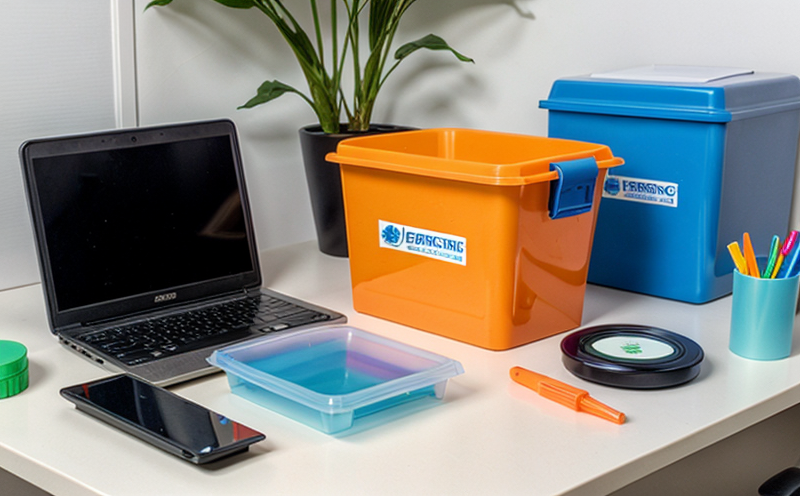UL 746C Electrical Safety Testing of Office Plastic Housings
The UL 746C standard is a key part of ensuring that plastic housings used in office and stationery products meet the highest electrical safety standards. This standard is crucial for protecting consumers from potential hazards such as electrical shock or fire caused by faulty plastic components.
UL 746C testing involves several critical steps, including material selection, design considerations, manufacturing processes, and final product evaluation. The goal is to ensure that the plastic housing can withstand various environmental conditions without compromising its structural integrity or electrical safety. This includes resistance to heat, cold, moisture, and other factors that could degrade the material over time.
The testing process typically begins with selecting appropriate materials based on UL 746C specifications. These materials must be capable of providing insulation against both high voltage and low voltage scenarios while maintaining mechanical properties necessary for durability and performance in office environments. Once selected, these materials undergo rigorous processing methods like injection molding or extrusion to create the housing components.
After fabrication, samples are subjected to a series of tests aimed at evaluating their electrical insulation characteristics under different conditions. This includes dielectric strength testing where voltage is applied across the sample to determine how well it insulates against electrical current flow. Another important test is tracking resistance measurement which helps identify any breakdowns in insulation that could lead to short circuits or arcing.
Temperature cycling tests are also performed to assess the stability of the material when exposed to wide temperature ranges commonly encountered within typical office settings. These cycles simulate real-world usage environments where temperatures may fluctuate significantly throughout the day. Additionally, flammability testing ensures that should a fire occur due to some unforeseen circumstance, the plastic will not spread flames quickly or contribute excessively towards spreading the blaze.
Impact testing further evaluates how resistant the housing is against physical impacts such as dropping onto hard surfaces or being struck by objects during normal operation. This helps ensure longevity and reliability even under harsher conditions than those typically found in standard office operations.
In summary, UL 746C electrical safety testing plays a vital role in safeguarding users from potential risks associated with improperly designed or manufactured plastic housings for office equipment like printers, copiers, filing cabinets, etc. By adhering to this stringent set of guidelines and undergoing thorough evaluation processes outlined by UL (Underwriters Laboratories), manufacturers can produce products that not only meet regulatory requirements but also exceed expectations regarding quality and safety standards.
Applied Standards
The primary standard applied in this service is UL 746C, which specifies the electrical performance criteria for thermoplastic resins used in the manufacture of products such as office furniture and equipment. This includes ensuring that these materials can safely handle voltages up to certain limits without failing or exhibiting hazardous behavior.
UL 746C covers a wide range of tests designed to evaluate various aspects of plastic performance, including resistance to heat, cold, moisture absorption, mechanical strength, and electrical insulation properties. These tests are critical in determining whether the material meets the stringent requirements set forth by UL for use in office environments.
Some key components tested include: - Dielectric breakdown voltage: Determines the maximum voltage that can be safely applied across the insulating layer before it fails. - Heat aging resistance: Measures how well the plastic retains its properties after exposure to high temperatures over extended periods. - Flame spread rating: Assesses the rate at which flames spread along the surface of the material when subjected to ignition sources.
By adhering strictly to UL 746C, manufacturers can ensure that their products not only comply with regulatory requirements but also provide a high level of safety for end-users. This standardization helps build consumer confidence and trust in office equipment made from compliant materials.
Scope and Methodology
The scope of UL 746C electrical safety testing encompasses a comprehensive evaluation of the mechanical, thermal, and electrical properties of thermoplastic resins intended for use in office furniture and equipment. This includes assessing the material's ability to resist breakdown under specified voltage levels, maintain insulating capabilities even after exposure to elevated temperatures, and exhibit low smoke density and flame spread rates when exposed to fire hazards.
The methodology involves several key steps: - Initial sample preparation: Ensures that all samples are cut from the same batch of material to minimize variability. - Dielectric strength testing: Applies alternating current (AC) or direct current (DC) voltage between two electrodes separated by the insulating layer, measuring the point at which dielectric breakdown occurs. - Heat aging test: Exposes specimens to controlled temperature environments over extended periods to observe changes in physical and chemical properties due to prolonged exposure to heat. - Flame propagation test: Evaluates how quickly flames spread across the surface of the sample when exposed to an ignition source, assessing both flame retardancy and smoke generation characteristics.
Throughout these tests, detailed records are kept regarding observations made during each phase, ensuring transparency and consistency in reporting results. Compliance with UL 746C provides assurance that products meet rigorous safety standards, fostering trust among consumers who rely on reliable office equipment.
International Acceptance and Recognition
UL 746C electrical safety testing holds significant international recognition due to its stringent requirements and comprehensive approach to ensuring product safety. Many countries, including the United States, Canada, Australia, New Zealand, and various European Union member states, accept products that comply with UL standards.
The acceptance of UL 746C extends beyond mere compliance; it reflects a commitment to maintaining high-quality standards across global markets. This is particularly important for industries where product safety directly impacts user health and well-being, such as office furniture manufacturing.
Manufacturers who adhere to UL 746C enjoy several benefits: - Enhanced reputation: Compliance signals reliability and quality assurance. - Broader market access: Products can be sold internationally without additional testing requirements in many countries that recognize the standard. - Regulatory compliance: Ensures adherence to local regulations regarding electrical safety, thus reducing legal risks associated with non-compliance.





